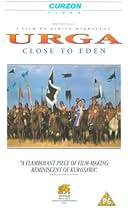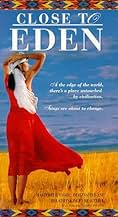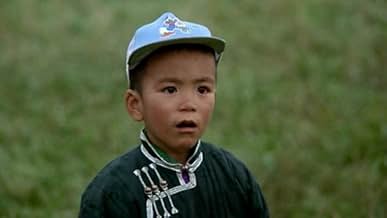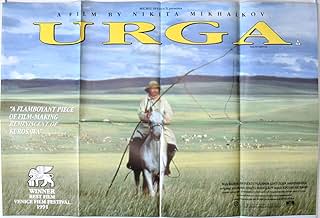IMDb-BEWERTUNG
7,5/10
3991
IHRE BEWERTUNG
Füge eine Handlung in deiner Sprache hinzuA curious friendship develops between Gombo, a young Mongolian shepherd living with his wife and family in a hut, deep in the wilderness of the steppes, and Sergei, a Russian worker whose tr... Alles lesenA curious friendship develops between Gombo, a young Mongolian shepherd living with his wife and family in a hut, deep in the wilderness of the steppes, and Sergei, a Russian worker whose truck breaks down not far from Gombo's hut.A curious friendship develops between Gombo, a young Mongolian shepherd living with his wife and family in a hut, deep in the wilderness of the steppes, and Sergei, a Russian worker whose truck breaks down not far from Gombo's hut.
- Für 1 Oscar nominiert
- 5 Gewinne & 12 Nominierungen insgesamt
Nikolay Vashchilin
- Nikolai
- (as Nikolai Vachtchiline)
Larisa Kuznetsova
- Marina
- (as Larisa Kuwnetsova)
Nikita Mikhalkov
- Bicycle rider
- (Nicht genannt)
Empfohlene Bewertungen
10adipocea
What Mikhalkov and his actors did here is unbelievable. I mean, let aside the immense value of this film, I keep wondering how did they do that? How the hack came such an idea to them, to make such a...how should I say, different, crazy, enormous movie ? How did they make those kids play such terrific performances?! Not one of them, but three...You will say that they weren't really uneducated kids from the steppes but educated kids with school that were just acting. Yeah, but how the hell can a kid from the city slip under the skin of a character that lives his entire life in the steppe?! And the performance of Vladimir Gostyukin is nothing less than BRILLIANT. Stands on the same level with the great performances of the great American and British actors, I mean Hanks, Hackman, Hopkins, etc. Oh, it was so easy to screw it up, this movie. A good straight old American movie with this theme would have been like this : the guys are living in the steppe, poetry, here comes the Russian, communication, friendship, then the balance is disturbed, violence come, outside forces that try to ruin the life of the characters, the characters fight, win, the Russian leaves, they say goodbye, they cry, last shot, the Russian appears at the horizon to see them again. Nothing like that in this movie. It is SOOO smart!!!!! Bravo for the Golden Lion, perfectly deserved!
One of the best films I know: beautiful, pensive, playful, realistic, poetic, humane, up-lifting. In the barrage of trash, one of the few films that makes me believe in humanity. I love this film so much that I arranged home projections for my friends several times. With all the up beat that I am mentioning, it is very open and truthful. Where in an American movie could you see an on-screen slaughter of a real lamb? And it was not ugly or gory at all! On the contrary, it was very decent and sensitive, teaching us respect for Nature.
And another little point. Has anybody noticed the inconspicuous little voice-over at the end which essentially makes "Urga" science fiction?!
And another little point. Has anybody noticed the inconspicuous little voice-over at the end which essentially makes "Urga" science fiction?!
10johan-16
This movie shows us a world without any borders, laws. Just a bunch of people who live in a superb nature, which fills the wide moviescreen in its endless beauty. It reminds us, how far we are away from nature, from our roots of our ancesters. That's why I think this movie appeals the people from all over the world. And especially those who like the widescreen movies from John Huston to Visconti. Only for the superb shots you can see it over and over again. It's, without any doubt a timeless beaty
The best definition I can give to movies I greatly admire is that they take me someplace I don't expect to go.
It can be a special location. It can be a special moment. It can be a special revelation.
Close to Eden, as this movie has been titled in the United States, offers the entire combination. A 1992 Russian nominee for the Oscar for Best Foreign Language Film, the movie opens on the vast grassy expanses of the steppes of Mongolia, where the setting initially is evocative of a certain timelessness. The historical instant cannot be ascertained confidently, even within an error margin of a few centuries. Nor do we know what the movie designs ultimately to tell us.
Such uncertainty begins to give way as a vehicle and visitor enter the scene and are involved in a mishap that results from first sleepiness and then fright. The nature of the vehicle and visitor narrow the reference era to an accuracy level of mere decades. From there, the plot leads to a likable nuclear family of herders, to which a grandmother is attached. We follow their story and soon learn when, among the vast expanses of time, it occurs.
The theme here is subtly...ecological...in three parts. The first part concerns the lifestyle of the family, and its self-sufficiency. The second part concerns the travel the father undertakes, and the reason for the travel, an assigned errand he seeks to accomplish in the course of that journey. The third part concerns the conclusion, where the issue of time again intervenes. There is in fact no timelessness, but rather its passage. The narrator in A River Runs Through It is "haunted by waters." Similarly, the ending of Close to Eden is haunted by grasses. Its status as one of the great foreign films arrives in the last few knockout minutes.
It can be a special location. It can be a special moment. It can be a special revelation.
Close to Eden, as this movie has been titled in the United States, offers the entire combination. A 1992 Russian nominee for the Oscar for Best Foreign Language Film, the movie opens on the vast grassy expanses of the steppes of Mongolia, where the setting initially is evocative of a certain timelessness. The historical instant cannot be ascertained confidently, even within an error margin of a few centuries. Nor do we know what the movie designs ultimately to tell us.
Such uncertainty begins to give way as a vehicle and visitor enter the scene and are involved in a mishap that results from first sleepiness and then fright. The nature of the vehicle and visitor narrow the reference era to an accuracy level of mere decades. From there, the plot leads to a likable nuclear family of herders, to which a grandmother is attached. We follow their story and soon learn when, among the vast expanses of time, it occurs.
The theme here is subtly...ecological...in three parts. The first part concerns the lifestyle of the family, and its self-sufficiency. The second part concerns the travel the father undertakes, and the reason for the travel, an assigned errand he seeks to accomplish in the course of that journey. The third part concerns the conclusion, where the issue of time again intervenes. There is in fact no timelessness, but rather its passage. The narrator in A River Runs Through It is "haunted by waters." Similarly, the ending of Close to Eden is haunted by grasses. Its status as one of the great foreign films arrives in the last few knockout minutes.
10Fafouin
I had to embrace my aunt after seeing this movie for having brought me to see it. The images are beautiful and the relationships are, at times, complex but always touching. Never have I experienced a filmmaker able to capture the beautiful humanity of each of his characters and their gestures. This film is a treasure and quite possibly my favorite film of all time.
Wusstest du schon
- WissenswertesThis was the first film nominated for an Academy Award for Best Foreign Language Film from Russia. Previous nominees from that country had been submitted from The Soviet Union. It lost to France's Indochine (1992).
Top-Auswahl
Melde dich zum Bewerten an und greife auf die Watchlist für personalisierte Empfehlungen zu.
- How long is Close to Eden?Powered by Alexa
Details
Box Office
- Bruttoertrag in den USA und Kanada
- 377.832 $
- Weltweiter Bruttoertrag
- 377.832 $
- Laufzeit1 Stunde 59 Minuten
- Farbe
- Seitenverhältnis
- 1.85 : 1
Zu dieser Seite beitragen
Bearbeitung vorschlagen oder fehlenden Inhalt hinzufügen


























